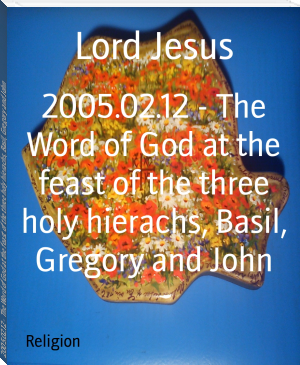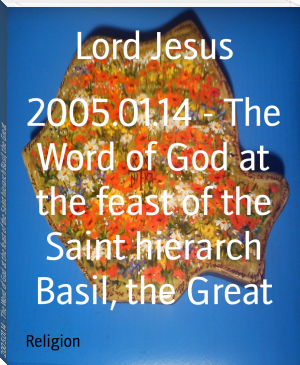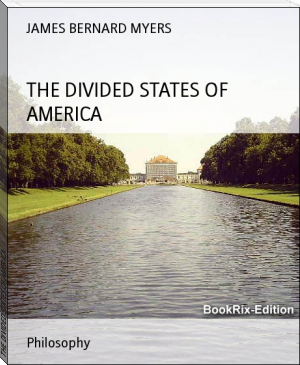The Book of Missionary Heroes by Basil Mathews (young adult books to read .txt) 📕

- Author: Basil Mathews
- Performer: -
Book online «The Book of Missionary Heroes by Basil Mathews (young adult books to read .txt) 📕». Author Basil Mathews
Mary Slessor was on her mettle.
"When you think of the woman's power," she said to the chief, "you forget the power of the woman's God. I shall go on."
And to the amazement of the savages in the villages she went on into the darkness. Surely she must be mad. She defied their chief who had the power to kill her. She had walked on into a forest where ferocious leopards abounded ready to spring out upon her, and where men were drinking themselves into a fury of war. And for what? To try with a woman's tongue to stop the fiery chiefs and the savages of a distant warlike tribe from fighting. Surely she was mad.
Facing the Warriors
She pressed on through the darkness. Then she saw the dim outlines of huts. Mary Slessor had reached the first town in the war area. She found the hut where an old Calabar woman lived who knew the white Ma.
"Who is there?" came a whisper from within.
But even as she replied there was a swift patter of bare feet. Out of the darkness leapt a score of armed warriors. They were all round her. From all parts dark shadows sprang forward till scores of men with their chiefs were jostling, chattering and threatening.
"What have you come for?" they asked.
"I have heard that you are going to war. I have come to ask you not to fight," she replied.
The chiefs hurriedly talked together, then they came to her and said—
"The white Ma is welcome. She shall hear all that we have to say before we fight. All the same we shall fight. For here you see are men wounded. We must wipe out the disgrace that is put upon us. Now she must rest. Women, you take care of the white Ma. We will call her at cock-crow when we start."
This meant an hour's sleep. Mary Slessor lay down in a hut. It seemed as though her eyes were hardly shut before she was wakened again. She stood, tottering with tiredness, when she heard the cry—
"Run, Ma, run!"
The warriors were off down the hill away to the fight. She ran, but they were quickly out of sight on the way to the attack. Was all her trouble in vain? She pressed on weak and breathless, but determined. She heard wild yells and the roll of the war drum. The warriors she had followed were feverishly making ready to fight, a hundred yards distant from the enemy's village.
She went up to them and spoke sternly.
"Behave like men," she said, "not like fools. Do not yell and shout. Hold your peace. I am going into the village there."
She pointed to the enemy. Then she walked forward. Ahead of her stood the enemy in unbroken ranks of dark warriors. They stood like a solid wall. She hailed them as she walked forward.
There was an ominous silence. She laughed.
"How perfect your manners are!" she exclaimed. She was about to walk forward and force them to make way for her when an old chief stepped out toward her and, to her amazement, knelt down at her feet.
"Ma," he said, "we thank you for coming to us. We own that we wounded the chief over there. It was only one of our men who did it. It was not the act of all our town. We ask you that you will speak with our enemy to bring them to peace with us."
The Healed Chief
She looked into the face of the chief. Then she saw to her joy that this was the very chief whom she had toiled through the rain to heal long ago. Because of what she had done then, he was now at her feet asking her to make peace. Should she run back and tell the warriors, who a hundred yards away were spoiling for a fight? That was her first joyful thought. Then she saw that she must first make her authority stronger over the whole band of warriors.
"Stay where you are," she said. "Some of you find a place where I can sit in comfort; and bring me food. I will not starve while men fight. Choose two or three men to speak well for you, and we will have two men from your enemies."
These grim warriors, so sullen and threatening a few moments ago, obeyed her every word. At length two chiefs came from the other side and stood on one side of her, while the two chiefs chosen in the village came and threw down their arms and knelt at their feet.
"Your chief," they said, "was wounded by a drunken youth. Do not let us shed blood through all our villages because of what he did. If you will cease from war with us, we will pay to you any fine that the white Ma shall say."
She, too, pressed them to stop their fighting. Word went back to the warriors on both sides, who became wildly excited. Some agreed, others stormed and raged till they were in a frenzy. Would they fight even over her body? Furious warriors came moving up from both sides. But by arguing and appealing at last she persuaded the warlike tribe to accept a fine.
The Promise of Peace
The town whose drunken youth had wounded the enemy chief at once paid a part of the fine. They used no money. So the fine was paid in casks and bottles of trade gin. Mary Slessor trembled. For as the boxes of gin bottles were brought forward the warriors pranced with excitement and made ready to get drunk. She knew that this would make them fight after all. What could she do? The roar of voices rose. She could not make her own voice heard. A daring idea flashed into her mind. According to the law of these Egbo people, clothes thrown over anything give it the protection of your body. She snatched off her skirt and all the clothing she could spare and spread them over the gin. She seized the one glass that the tribe had, and doled out one portion only to each chief to test whether the bottles indeed contained spirit. At last they grew quieter and she spoke to them.
"I am going," she said, "across the Great Waters to my home, and I shall be away many moons. Promise me here, on both sides, that you will not go to war with one another while I am away."
"We promise," they said. They gathered around her and she told them the story of Jesus Christ in whose name she had come to them.
"Now," she said, "go to your rest and fight no more." And the tribes kept their promise to her,—so that when she returned they could say, "It is peace."
For nearly forty years she worked on in Calabar, stricken scores of times with fever. She rescued her hundreds of twin babies thrown out to die in the forest, stopped wars and ordeal by poison, made peace, healed the sick.
At last, too weak to walk, she was wheeled through the forests and along the valleys by some of her "twins" now grown to strong children, and died there—the conquering Queen of Calabar, who ruled in the hearts of even the fiercest cannibals through the power of the Faith, by which out of weakness she was made strong.
[57] The African uses the word "Ma" as mother, (a) to name a woman after her eldest son, e.g. Mrs. Livingstone was called Ma-Robert; and (b) as in this case, for a woman whom they respect.
Book Four: HEROINES AND HEROES OF PLATEAU AND DESERT CHAPTER XXIII SONS OF THE DESERTAbdallah and Sabat
(Time of Incidents, about 1800-1810)
Two Arab Wanderers
One day, more than a hundred years ago, two young Arabs, Abdallah and Sabat, rode on their camels toward a city that was hidden among the tawny hills standing upon the skyline.
The sun was beginning to drop toward the edge of the desert away in the direction of the Red Sea. The shadows of the long swinging legs of the camels wavered in grotesque lines on the sand. There was a look of excited expectation in the eyes of the young Arabs; for, by sunset, their feet would walk the city of their dreams.
They were bound for Mecca, the birthplace of Mohammed, the Holy City toward which every man of the Mohammedan world turns five times a day as he cries, "There is no God but Allah, and Mohammed is the prophet of Allah." To have worshipped in Mecca before the sacred Kaaba and to have kissed the black stone in its wall—this was to make Paradise certain for them both. Having done that pilgrimage these two Arabs, Sabat and Abdallah, would be able to take the proud title of "Haji" which would proclaim to every man that they had been to Mecca—the Holy of Holies.
So they pressed on by the valley between the hills till they saw before them the roofs and the minarets of Mecca itself. As darkness rushed across the desert and the stars came out, the tired camels knelt in the courtyard of the Khan,[58] and Sabat and Abdallah alighted and stretched their cramped legs, and took their sleep.
These young men, Sabat and Abdallah, the sons of notable Arab chiefs, had struck up a great friendship. Now, each in company with his chum, they were together at the end of the greatest journey that an Arab can take.
As the first faint flush of pink touched the mountain beyond Mecca, the cry came from the minaret: "Come to prayer. Prayer is better than sleep. There is no God but Allah."
Sabat and Abdallah were already up and out, and that day they said the Mohammedan prayer before the Kaaba itself with other pilgrims who had come from many lands—from Egypt and Abyssinia, from Constantinople and Damascus, Baghdad and Bokhara, from the defiles of the Khyber Pass, from the streets of Delhi and the harbour of Zanzibar.
We do not know what Abdallah looked like. He was probably like most young Arab chieftains, a tall, sinewy man—brown-faced, dark-eyed, with hair and a short-cropped beard that were between brown and black.
His friend Sabat was, however, so striking that even in that great crowd of many pilgrims people would turn to look at him. They would turn round, for one reason, because of Sabat's voice. Even when he was just talking to his friend his voice sounded like a roar; when he got excited and in a passion (as he very often did) it rolled like thunder and was louder than most men's shouting. As he spoke his large white teeth gleamed in his wide mouth. His brown face and black arched eyebrows were a dark setting for round eyes that flashed as he spoke. His black beard flowed over his tawny throat and neck. Gold earrings swung with his agitation and a gold chain gleamed round his neck. He wore a bright silk jacket with long sleeves, and long, loose-flowing trousers and richly embroidered shoes with turned-up toes. From a girdle round his waist hung a dagger whose handle and hilt flashed with jewels.
Abdallah and Sabat were better educated than most Arabs, for they could both read. But they were not men who could stay in one place and read and think in quiet. When they had finished their worship at Mecca, they determined to ride far away across the deserts eastward, even to Kabul in the mountains of Afghanistan. So they rode, first northward up the great camel-route toward Damascus, and then eastward. In spite of robbers and hungry jackals, through mountain gorges, over streams, across the Syrian desert from oasis to oasis, and then across the Euphrates





Comments (0)